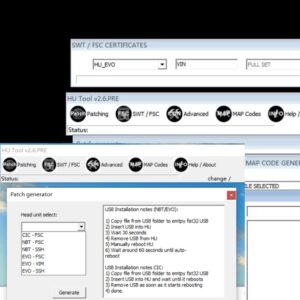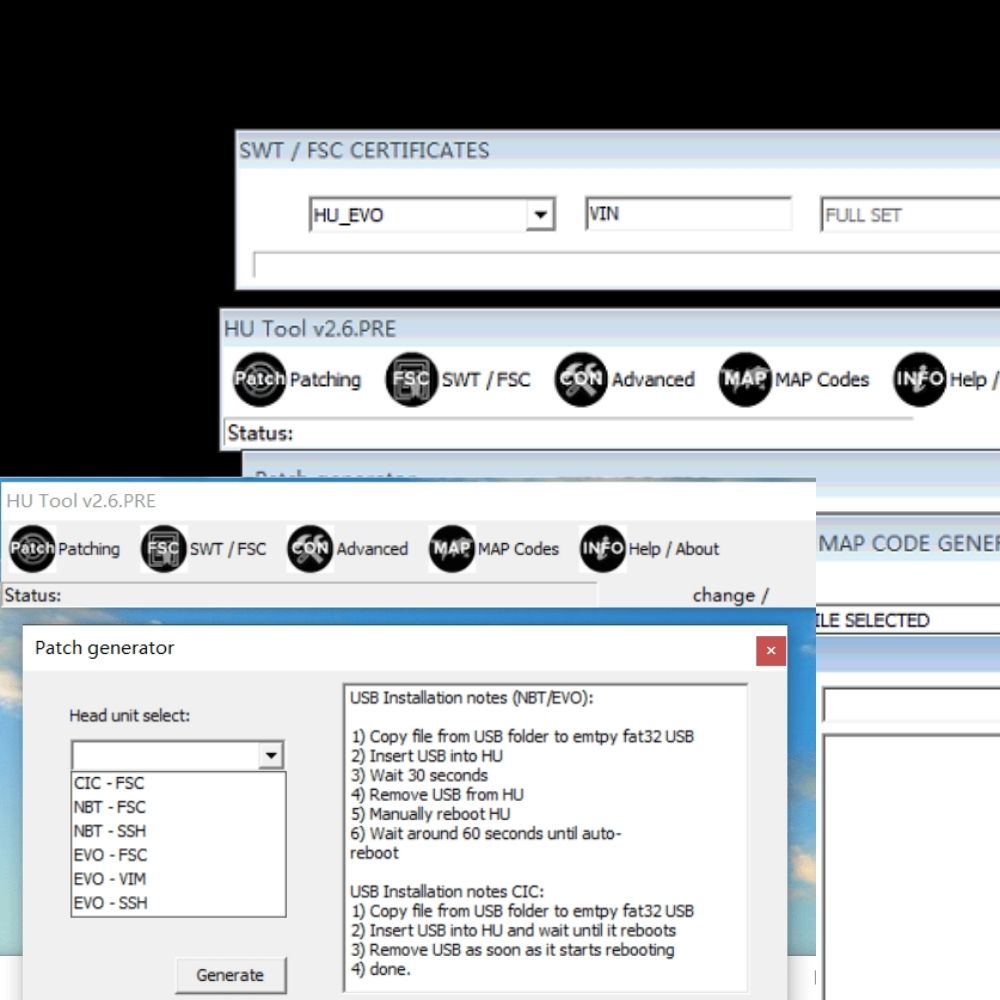
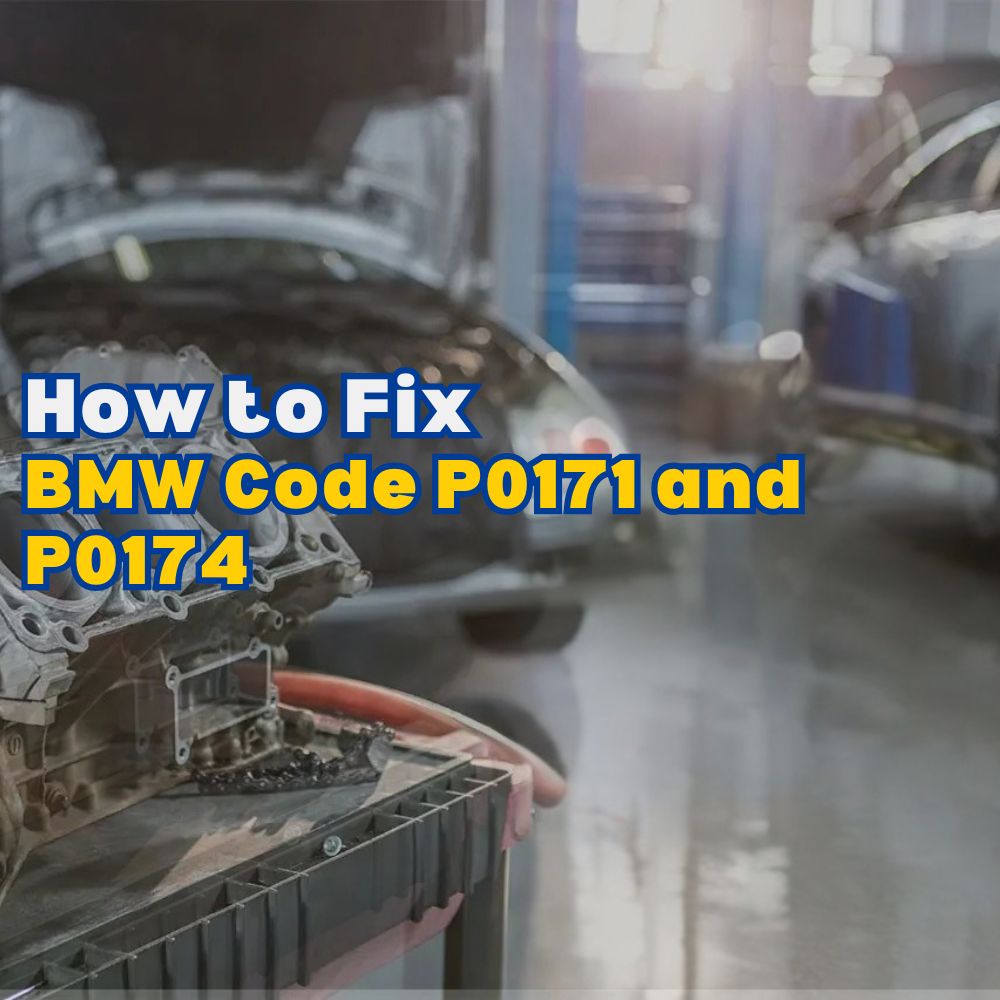
What Causes BMW Code P0171 and P0174 and How to Fix?
BMW code P0171 and P0174 indicate lean conditions in engine banks 1 and 2, respectively, but the solution involves systematically diagnosing and addressing the root cause, rather than immediately replacing parts. AutoExplain provides expert remote diagnostic and repair services to accurately pinpoint and resolve these issues. Understanding the potential causes and utilizing expert guidance ensures efficient troubleshooting and repair of BMW’s engine performance problems.
Table of Contents
Toggle1. What Do BMW Codes P0171 and P0174 Mean?
BMW codes P0171 and P0174 signal that the engine’s air-fuel mixture is running too lean, meaning there is too much air and not enough fuel in the system. These codes indicate that the Engine Control Unit (ECU) has detected a condition where the oxygen sensors are reporting excessive oxygen levels in the exhaust gases. Resolving these codes involves identifying and rectifying the underlying issues causing the lean condition to restore optimal engine performance and fuel efficiency.
- P0171 – System Too Lean (Bank 1): This code indicates that the air-fuel mixture in bank 1 of the engine is too lean.
- P0174 – System Too Lean (Bank 2): This code indicates that the air-fuel mixture in bank 2 of the engine is too lean.
1.1 What are Engine Banks?
Engine banks refer to the separate sets of cylinders in engines with a V-shaped or horizontally opposed configuration. Bank 1 typically includes the cylinder containing the number one spark plug, while Bank 2 is the opposite set of cylinders. Understanding engine banks is crucial for diagnosing issues like lean conditions because it helps technicians pinpoint which part of the engine is experiencing the problem.
1.2 What is the Air-Fuel Mixture?
The air-fuel mixture is the ratio of air to fuel that an engine needs to run efficiently. A “lean” mixture has too much air relative to fuel, while a “rich” mixture has too much fuel relative to air. Maintaining the correct air-fuel mixture is vital for optimal engine performance, fuel economy, and emissions control.
2. What are the Common Symptoms of BMW Codes P0171 and P0174?
The presence of BMW codes P0171 and P0174 can manifest through several noticeable symptoms, affecting your vehicle’s performance. Recognizing these symptoms is crucial for early diagnosis and resolution, ensuring your BMW continues to operate smoothly and efficiently. Here are common symptoms associated with these codes:
- Check Engine Light: The most common symptom is the illumination of the Check Engine Light on the dashboard.
- Poor Engine Performance: The engine may exhibit hesitation, stumbling, or a lack of power, especially during acceleration.
- Rough Idling: The engine may idle roughly or stall, particularly when the car is stopped or at low speeds.
- Decreased Fuel Economy: A lean running condition can lead to a noticeable decrease in fuel efficiency.
- Engine Misfires: Misfires can occur due to the improper air-fuel mixture, causing the engine to run unevenly.
- Difficulty Starting: The car may be harder to start than usual, especially in cold weather.
- Increased Emissions: The lean condition can cause higher than normal emissions, which may lead to failing an emissions test.
- Surging or Hesitation: The engine may surge or hesitate intermittently, making it difficult to maintain a steady speed.
3. What are the Potential Causes of BMW Codes P0171 and P0174?
BMW codes P0171 and P0174 can stem from a variety of underlying issues affecting the air-fuel mixture in your engine. Identifying these causes is essential for accurate diagnosis and effective repair. Here’s a detailed list of potential causes for these codes:
3.1 Vacuum Leaks
Vacuum leaks are a primary cause of lean conditions. Leaks in the intake manifold, vacuum hoses, or other components allow unmetered air to enter the engine, disrupting the air-fuel ratio.
3.2 Faulty Mass Air Flow (MAF) Sensor
The MAF sensor measures the amount of air entering the engine. If the MAF sensor is dirty or malfunctioning, it can provide incorrect readings to the ECU, leading to a lean condition.
3.3 Clogged Fuel Filter
A clogged fuel filter restricts the flow of fuel to the engine, resulting in a lean mixture.
3.4 Weak Fuel Pump
A weak fuel pump may not provide sufficient fuel pressure to the fuel injectors, causing a lean condition.
3.5 Faulty Oxygen Sensors
Although less common, faulty oxygen sensors can provide incorrect readings to the ECU, leading to an incorrect adjustment of the air-fuel mixture.
3.6 Leaking Fuel Injectors
Leaking fuel injectors can cause an inconsistent fuel supply, leading to a lean condition in specific cylinders.
3.7 Exhaust Leaks
Exhaust leaks near the oxygen sensors can introduce additional oxygen, causing the sensors to report a lean condition.
3.8 PCV System Issues
Problems with the Positive Crankcase Ventilation (PCV) system can cause vacuum leaks and disrupt the air-fuel mixture.
3.9 Intake Manifold Gasket Leak
A leaking intake manifold gasket can allow unmetered air to enter the engine, causing a lean condition.
3.10 Throttle Body Issues
A dirty or malfunctioning throttle body can affect airflow into the engine, leading to a lean condition.
3.11 Low Fuel Pressure
Low fuel pressure can result from a variety of issues, including a failing fuel pressure regulator or a clogged fuel line, causing the engine to run lean.
3.12 EVAP System Leaks
Leaks in the Evaporative Emission Control (EVAP) system can introduce extra air into the intake, leading to a lean condition.
3.13 Carbon Buildup on Intake Valves
Carbon buildup on the intake valves can restrict airflow, leading to a lean condition, especially in direct injection engines.
Alt: BMW N54 engine carbon buildup on intake valves, restricting airflow and causing lean condition.
4. How to Diagnose BMW Codes P0171 and P0174?
Diagnosing BMW codes P0171 and P0174 requires a systematic approach to identify the root cause of the lean condition. Here are the steps to follow for an accurate diagnosis:
4.1 Preliminary Checks
Begin with a visual inspection of the engine bay to check for obvious issues such as disconnected vacuum hoses, damaged wiring, or fuel leaks. Ensure that the air filter is clean and properly installed.
4.2 Scan for Diagnostic Trouble Codes (DTCs)
Use an OBD-II scanner to read and record all diagnostic trouble codes. Note any other codes present, as they may provide additional clues.
4.3 Check Freeze Frame Data
Review the freeze frame data associated with the P0171 and P0174 codes. This data provides a snapshot of the engine conditions when the codes were triggered, such as engine speed, load, and temperature.
4.4 Inspect Vacuum Hoses
Thoroughly inspect all vacuum hoses for cracks, leaks, or disconnections. Use a smoke machine to identify hard-to-find vacuum leaks.
4.5 Test the Mass Air Flow (MAF) Sensor
Use a multimeter to test the MAF sensor’s output. Compare the readings to the manufacturer’s specifications. Clean the MAF sensor with a MAF sensor cleaner if it appears dirty but is functioning correctly.
4.6 Check Fuel Pressure
Use a fuel pressure gauge to measure the fuel pressure at the fuel rail. Ensure that the pressure is within the specified range.
4.7 Inspect Fuel Injectors
Listen to each fuel injector with a stethoscope to check for proper operation. Perform a fuel injector balance test to identify any injectors that are not performing correctly.
4.8 Check Oxygen Sensors
Monitor the oxygen sensor readings using an OBD-II scanner. Ensure that the sensors are switching properly and responding to changes in the air-fuel mixture.
4.9 Inspect the Exhaust System
Check the exhaust system for leaks, especially near the oxygen sensors. Repair any leaks that are found.
4.10 Test the PCV System
Inspect the PCV valve and hoses for leaks or clogs. Perform a PCV system test to ensure it is functioning correctly.
4.11 Check for Intake Manifold Leaks
Spray carburetor cleaner or starting fluid around the intake manifold gasket while the engine is running. If the engine speed changes, there is likely an intake manifold leak.
4.12 Review Data from Live Sensors
Use a diagnostic scan tool to assess live sensor data, paying particular attention to the Mass Air Flow (MAF) sensor, oxygen sensors, and fuel trims. Abnormal readings can pinpoint the source of the lean condition.
- MAF Sensor Readings: Verify the MAF sensor readings at idle and under load. High or erratic readings may indicate a faulty sensor.
- Oxygen Sensor Readings: Monitor the upstream and downstream oxygen sensor readings to ensure they are switching properly.
- Fuel Trims: Observe short-term and long-term fuel trim values. High positive values indicate that the ECU is adding extra fuel to compensate for the lean condition.
4.13 Professional Diagnostic Services from AutoExplain
If you’re struggling to diagnose the issue or prefer expert assistance, AutoExplain offers remote diagnostic services. Our experienced technicians can guide you through the diagnostic process and provide accurate solutions.
5. How Can AutoExplain Help?
AutoExplain offers expert remote diagnostic and repair services tailored to address complex issues like BMW codes P0171 and P0174. Our services provide precise diagnostics, efficient solutions, and expert guidance to ensure your BMW runs optimally.
5.1 Remote Diagnostic Services
Our remote diagnostic services connect you with experienced technicians who can help diagnose the root cause of the P0171 and P0174 codes. Using advanced diagnostic tools and real-time data analysis, we pinpoint the exact issues affecting your vehicle.
5.2 Step-by-Step Guidance
We provide detailed, step-by-step instructions to guide you through the repair process. Our technicians offer clear, easy-to-follow advice, ensuring you can confidently perform the necessary repairs.
5.3 Access to Expert Technicians
Our team of certified technicians has extensive experience with BMW vehicles. They stay updated with the latest automotive technologies and repair techniques to provide the best possible service.
5.4 Cost-Effective Solutions
By offering remote diagnostic services, we help you avoid costly trips to the dealership or local mechanic. Our efficient and accurate diagnostics save you time and money.
5.5 Real-Time Support
We offer real-time support through WhatsApp, email, and other online platforms. Our technicians are available to answer your questions and provide assistance whenever you need it.
- WhatsApp: +1(936)2896695
- Email: [email protected]
5.6 Software Updates and Programming
AutoExplain also provides software updates and programming services for various vehicle systems, including ECU, TCM, BCM, and ABS. Ensure your BMW operates with the latest software for optimal performance and efficiency.
5.7 Key Programming Services
We offer key programming services to help you replace or reprogram your car keys. Our services are efficient and reliable, ensuring you regain access to your vehicle quickly.
5.8 Navigation Update Services
Keep your navigation system up-to-date with our navigation update services. We provide the latest maps and software to ensure accurate and efficient navigation.
5.9 Training and Education
AutoExplain offers training and educational resources for automotive technicians. Enhance your skills and knowledge with our comprehensive training programs, ensuring you stay ahead in the industry.
6. How to Fix BMW Codes P0171 and P0174?
Fixing BMW codes P0171 and P0174 involves addressing the underlying cause of the lean condition. Here are the detailed steps to resolve these codes:
6.1 Repair Vacuum Leaks
Locate and repair any vacuum leaks in the intake manifold, vacuum hoses, or other components. Replace cracked or damaged hoses and ensure all connections are secure.
6.2 Replace a Faulty Mass Air Flow (MAF) Sensor
If the MAF sensor is found to be faulty, replace it with a new, OEM-quality sensor. Ensure the new sensor is properly calibrated.
6.3 Replace a Clogged Fuel Filter
Replace the fuel filter to ensure a steady supply of fuel to the engine. Use a high-quality fuel filter that meets the manufacturer’s specifications.
6.4 Replace a Weak Fuel Pump
If the fuel pump is weak, replace it with a new fuel pump that provides adequate fuel pressure.
6.5 Replace Faulty Oxygen Sensors
If the oxygen sensors are faulty, replace them with new, OEM-quality sensors. Ensure the new sensors are properly installed and calibrated.
6.6 Repair Leaking Fuel Injectors
Clean or replace leaking fuel injectors to ensure a consistent fuel supply. Consider having the fuel injectors professionally cleaned and tested.
6.7 Repair Exhaust Leaks
Repair any exhaust leaks, especially near the oxygen sensors. Use exhaust sealant or replace damaged exhaust components.
6.8 Repair PCV System Issues
Repair any issues with the PCV system, including replacing the PCV valve or repairing any leaks in the PCV hoses.
6.9 Repair Intake Manifold Gasket Leak
Replace the intake manifold gasket if it is leaking. Ensure the new gasket is properly installed and torqued to the manufacturer’s specifications.
6.10 Clean the Throttle Body
Clean the throttle body to remove any carbon buildup that may be affecting airflow. Use a throttle body cleaner and a soft brush to clean the throttle plate and bore.
6.11 Address Low Fuel Pressure
Identify and address the cause of low fuel pressure, such as a failing fuel pressure regulator or a clogged fuel line. Replace any faulty components.
6.12 Repair EVAP System Leaks
Repair any leaks in the EVAP system, including replacing damaged hoses or components. Use a smoke machine to identify hard-to-find leaks.
6.13 Clean Carbon Buildup on Intake Valves
Clean the carbon buildup on the intake valves using a specialized cleaning tool or solvent. Consider a professional carbon cleaning service.
6.14 Clear the Diagnostic Trouble Codes (DTCs)
After performing the necessary repairs, use an OBD-II scanner to clear the diagnostic trouble codes.
6.15 Perform a Test Drive
Perform a test drive to ensure that the engine is running smoothly and that the P0171 and P0174 codes do not return. Monitor the engine performance and fuel trims during the test drive.
6.16 Professional Repair Services from AutoExplain
If you’re not comfortable performing the repairs yourself, AutoExplain can connect you with qualified technicians who can perform the necessary repairs. Contact us for assistance.
7. What are the Tools Needed to Fix BMW Codes P0171 and P0174?
To effectively diagnose and repair BMW codes P0171 and P0174, you will need a variety of specialized tools. Having the right equipment ensures accurate diagnostics and efficient repairs. Here’s a comprehensive list of tools required:
- OBD-II Scanner: To read and clear diagnostic trouble codes and monitor live sensor data.
- Multimeter: To test electrical components such as the MAF sensor and oxygen sensors.
- Fuel Pressure Gauge: To measure the fuel pressure at the fuel rail.
- Vacuum Gauge: To check for vacuum leaks in the intake system.
- Smoke Machine: To locate hard-to-find vacuum leaks.
- Stethoscope: To listen to fuel injectors and other components for proper operation.
- Fuel Injector Tester: To test the performance of fuel injectors.
- Compression Tester: To check the compression of each cylinder.
- Socket Set: To remove and install various engine components.
- Wrench Set: To tighten and loosen nuts and bolts.
- Screwdriver Set: To remove and install screws.
- Pliers: To grip and manipulate hoses and wires.
- Torque Wrench: To ensure proper torque when tightening bolts.
- MAF Sensor Cleaner: To clean the MAF sensor.
- Throttle Body Cleaner: To clean the throttle body.
- Penetrating Oil: To loosen corroded bolts and nuts.
- Work Gloves: To protect your hands during repairs.
- Safety Glasses: To protect your eyes from debris and chemicals.
8. Can I Drive My BMW With Codes P0171 and P0174?
While it is technically possible to drive your BMW with codes P0171 and P0174, it is not recommended. Driving with a lean condition can lead to several potential problems:
- Reduced Engine Performance: The engine may run poorly, with reduced power and acceleration.
- Poor Fuel Economy: The lean condition can cause a decrease in fuel efficiency.
- Engine Damage: Prolonged lean running can lead to overheating, pre-ignition, and potential damage to engine components such as pistons and valves.
- Catalytic Converter Damage: The lean condition can cause the catalytic converter to overheat and fail prematurely.
- Increased Emissions: The lean condition can cause higher than normal emissions, which may lead to failing an emissions test.
It is best to address the underlying cause of the P0171 and P0174 codes as soon as possible to prevent further damage. Contact AutoExplain for expert diagnostic and repair services to resolve the issue quickly and efficiently.
9. How Much Does It Cost to Fix BMW Codes P0171 and P0174?
The cost to fix BMW codes P0171 and P0174 can vary widely depending on the underlying cause and the extent of the repairs needed. Here is a general estimate of potential costs:
- Vacuum Leak Repair: $50 – $200 (depending on the location and complexity of the leak)
- MAF Sensor Replacement: $150 – $400
- Fuel Filter Replacement: $50 – $150
- Fuel Pump Replacement: $300 – $700
- Oxygen Sensor Replacement: $100 – $300 per sensor
- Fuel Injector Cleaning or Replacement: $100 – $500 (depending on the number of injectors and the type of service)
- Exhaust Leak Repair: $50 – $300 (depending on the location and severity of the leak)
- PCV Valve Replacement: $50 – $200
- Intake Manifold Gasket Replacement: $200 – $600
- Throttle Body Cleaning: $50 – $150
These are just estimates, and the actual cost may vary. To get an accurate estimate, it is best to have a qualified technician diagnose the problem and provide a detailed quote. AutoExplain offers remote diagnostic services to help you identify the problem and estimate the cost of repairs.
10. How Can I Prevent BMW Codes P0171 and P0174 From Recurring?
Preventing BMW codes P0171 and P0174 from recurring involves regular maintenance and proactive care of your vehicle. Here are some tips to help prevent these codes from appearing:
- Regular Maintenance: Follow the manufacturer’s recommended maintenance schedule, including oil changes, filter replacements, and tune-ups.
- Inspect Vacuum Hoses: Regularly inspect vacuum hoses for cracks, leaks, or disconnections. Replace any damaged hoses promptly.
- Clean the MAF Sensor: Clean the MAF sensor periodically to ensure it is providing accurate readings.
- Replace the Fuel Filter: Replace the fuel filter at the recommended intervals to ensure a steady supply of fuel to the engine.
- Check Fuel Pressure: Periodically check the fuel pressure to ensure it is within the specified range.
- Inspect Fuel Injectors: Have the fuel injectors professionally cleaned and tested to ensure they are functioning properly.
- Check Oxygen Sensors: Monitor the oxygen sensor readings and replace the sensors at the recommended intervals.
- Inspect the Exhaust System: Check the exhaust system for leaks and repair any leaks promptly.
- Maintain the PCV System: Ensure the PCV system is functioning correctly by replacing the PCV valve and inspecting the hoses for leaks or clogs.
- Use Quality Fuel: Use high-quality fuel that meets the manufacturer’s specifications.
- Address Issues Promptly: Address any engine performance issues promptly to prevent them from escalating into more significant problems.
FAQ: BMW Codes P0171 and P0174
Q1: What does it mean when my BMW shows codes P0171 and P0174?
BMW codes P0171 and P0174 indicate that the engine is running lean, meaning there is too much air and not enough fuel in the air-fuel mixture in engine banks 1 and 2, respectively.
Q2: Can a dirty MAF sensor cause these codes?
Yes, a dirty or malfunctioning Mass Air Flow (MAF) sensor is a common cause of P0171 and P0174 codes, as it can provide incorrect readings to the ECU, leading to a lean condition.
Q3: How do vacuum leaks contribute to these codes?
Vacuum leaks allow unmetered air to enter the engine, disrupting the air-fuel ratio and causing a lean condition, which triggers the P0171 and P0174 codes.
Q4: Is it safe to drive with these codes showing?
Driving with P0171 and P0174 codes is not recommended, as it can lead to reduced engine performance, poor fuel economy, and potential damage to engine components and the catalytic converter.
Q5: How often should I replace my BMW’s oxygen sensors?
Oxygen sensors should be replaced every 60,000 to 100,000 miles to ensure they are providing accurate readings to the ECU and maintaining optimal engine performance.
Q6: Can a clogged fuel filter cause these codes?
Yes, a clogged fuel filter can restrict the flow of fuel to the engine, resulting in a lean mixture and triggering the P0171 and P0174 codes.
Q7: What is the role of fuel injectors in these lean codes?
Leaking or malfunctioning fuel injectors can cause an inconsistent fuel supply, leading to a lean condition in specific cylinders and contributing to the P0171 and P0174 codes.
Q8: How can AutoExplain help diagnose these codes remotely?
AutoExplain offers expert remote diagnostic services, providing step-by-step guidance and using advanced diagnostic tools to pinpoint the exact issues causing the P0171 and P0174 codes.
Q9: Are there any specific BMW models more prone to these codes?
While any BMW model can experience these codes, older models and those with higher mileage are generally more prone to developing vacuum leaks and other issues that can cause P0171 and P0174.
Q10: Can I fix these codes myself, or should I seek professional help?
While some repairs can be done by experienced DIYers, it’s often best to seek professional help, especially if you’re unsure about the diagnosis or repair procedures. AutoExplain can provide expert guidance and connect you with qualified technicians if needed.
Conclusion
Addressing BMW codes P0171 and P0174 requires a thorough understanding of potential causes and a systematic diagnostic approach. AutoExplain is here to support you with expert remote diagnostic and repair services, ensuring your BMW runs smoothly and efficiently. Contact us today for assistance and let our experienced technicians guide you through the process. Reach out via WhatsApp at +1(936)2896695 or email us at [email protected]. Visit our website at AutoExplain for more information. Our office is located at 1500 N Grant ST Sten Denver, CO 80203.

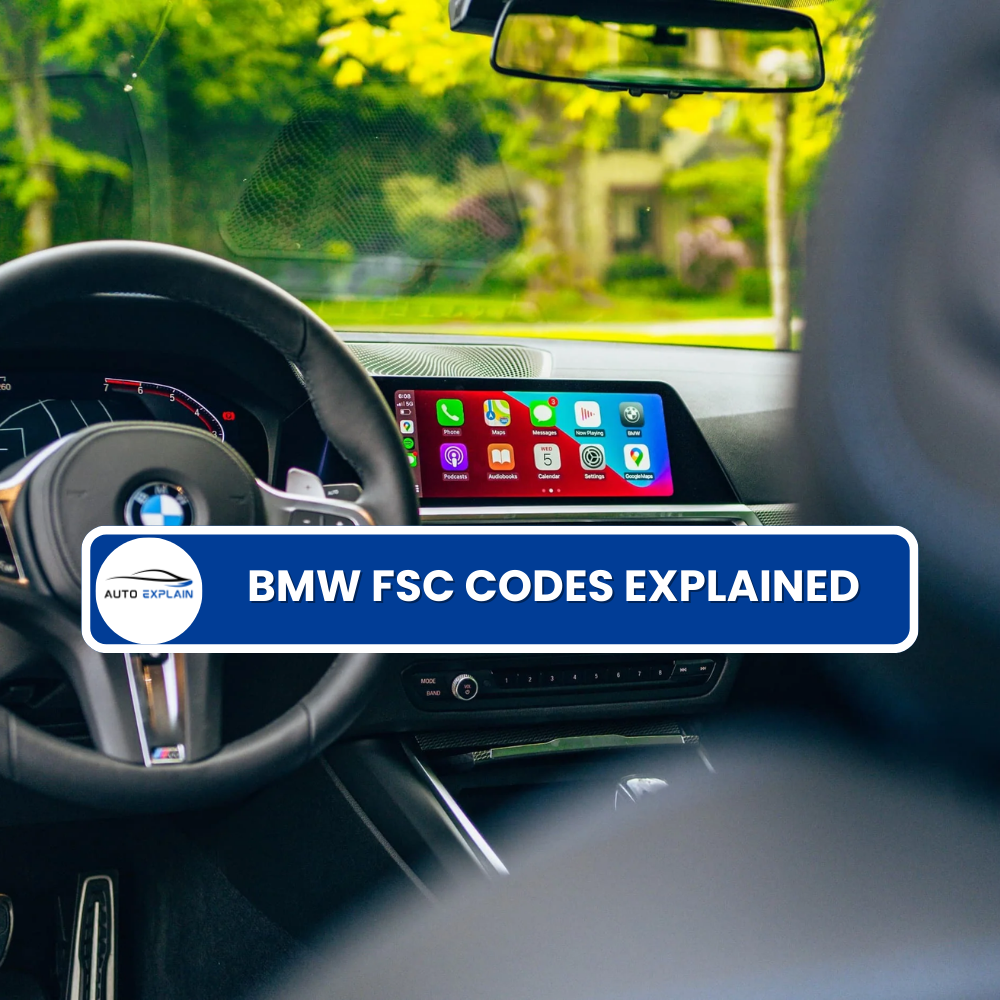
BMW FSC Codes Explained: Full FSC Code List for F-Series
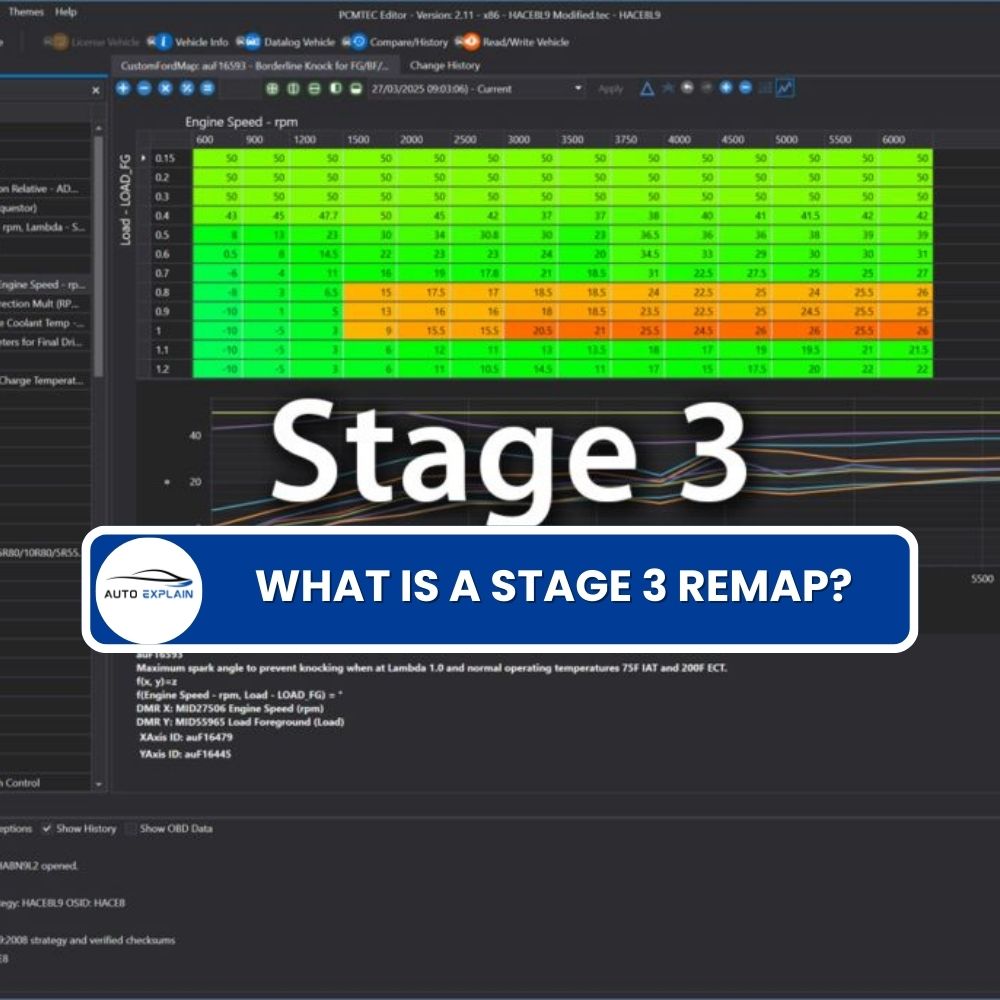
What is a Stage 3 Remap?

The Best Car Tuning Software in 2026: A Comprehensive Guide for Professionals




